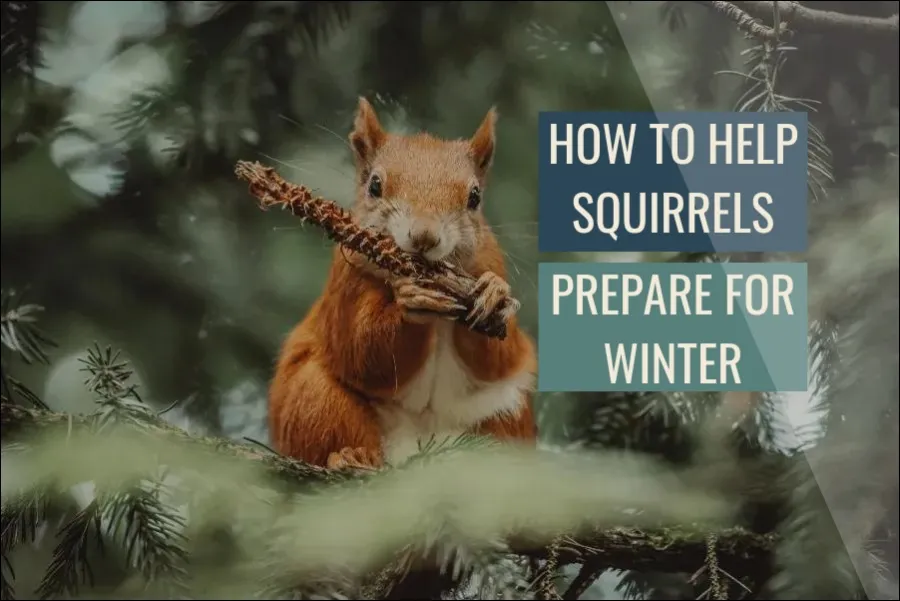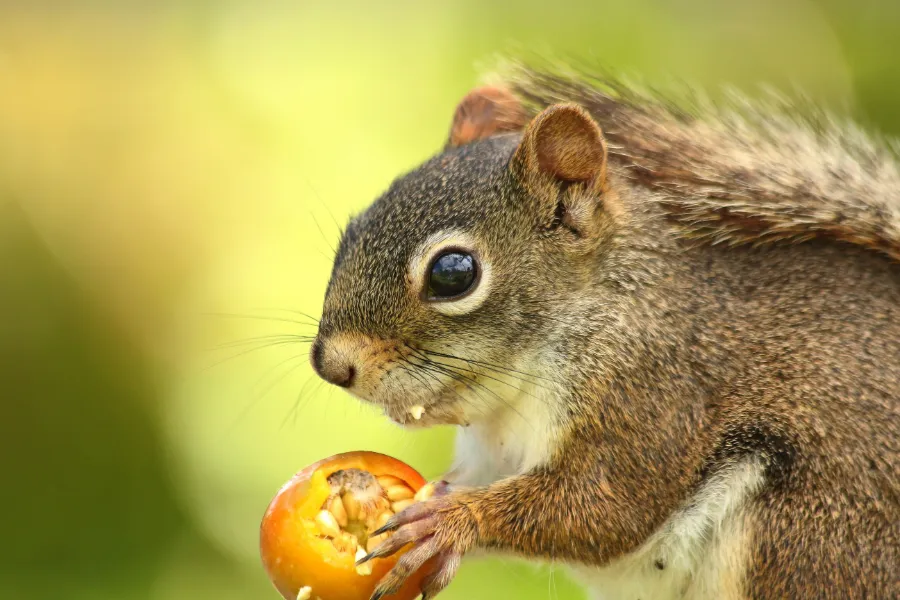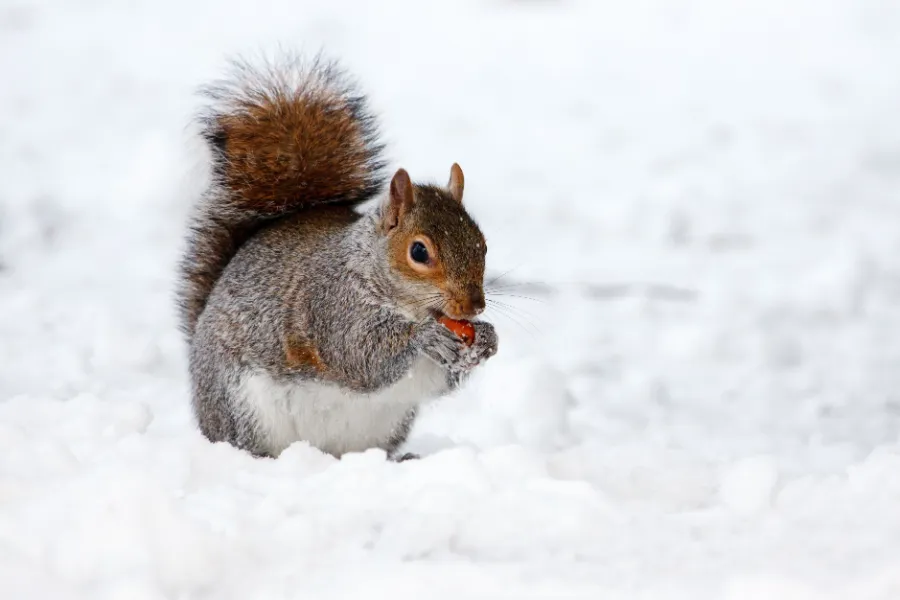
Winter can be a tough time for squirrels, as they must gather enough food to sustain themselves through the colder months.
To help squirrels survive the winter, provide extra food, create a winter garden, build a warm shelter, protect from predators, and ensure access to clean water. Keep harmful substances away and control rodents humanely. Educate others on how to help these animals.
From providing extra food to creating cozy shelters, there are many ways you can support squirrels as they hunker down for the winter.
Understanding squirrel behavior in winter
Understanding the many habits and adaptations that squirrels display during the winter months is critical for effectively assisting them in preparing for and surviving the colder season. Gathering and storing food is a critical adaption. Squirrels are well-known for their meticulous collection and storage of nuts and seeds, which they bury in various areas to eat later. It has been discovered that they recall the locations of thousands of these caches. In addition to harvesting and storing food, squirrels may seek refuge throughout the winter by digging underground or using dens or nest boxes provided by people. Finally, squirrels may go into torpor to preserve energy, which causes their body temperature and metabolism to drop dramatically. This permits them to withstand the cold months on less food and energy.
Providing extra food for squirrels
Extra food for squirrels over the winter might be a lifeline for them during the colder months, when natural food supplies may be short. Nuts, seeds, and fruits are some dietary alternatives for squirrels. Peanuts, sunflower seeds, and walnuts are among the most popular. Remember that squirrels are omnivorous, which means they may consume vegetables and grains in addition to nuts and seeds. These items can be offered in a variety of ways, including in a bird feeder, in a feeding tray, or directly on the ground. Just be sure to throw away any uneaten food on a regular basis to avoid attracting bugs.
Creating a squirrel-friendly winter garden
A squirrel-friendly winter garden, in addition to offering immediate food sources, can assist these critters survive the colder months. This can be accomplished by planting trees, shrubs, and flowers that yield nuts, seeds, and berries suitable for squirrel consumption. Consider oak trees (which generate acorns), hickory trees (which produce nuts), and berry-producing shrubs such as winterberry and viburnum. In addition to food, these plants may provide squirrels with refuge, either through their dense foliage or the holes they build in their trunks and branches.

Building or providing a warm shelter for squirrels
Providing squirrels with a warm, dry place to stay throughout the winter can be a vital method to assist them in surviving the harsher months. There are several approaches for accomplishing this. One option is to construct a squirrel nest box, which is a tiny wooden construction with an entrance and exit hole for squirrels. Nest boxes are available in a variety of materials and can be purchased or built at home. Another alternative is to offer an insulated housing or shelter, which can be bought or built at home from materials such as wood, cardboard, or plastic. It is critical to locate the shelter in a sheltered area, such as a tree or on the side of a building, and to keep the entrance facing away from the prevailing winds.
Protecting squirrels from predators
Winter may be a perilous period for squirrels because of predators including cats, dogs, and birds of prey. It is critical to keep your own pets under control and to oversee them when they are outside to safeguard these creatures. Nest boxes or insulated homes can also be used to give squirrels with refuge and hiding areas where they can avoid predators. Furthermore, removing or cutting thick vegetation, as well as utilizing fence or netting, can help keep predators out of locations where squirrels live.
Ensuring access to clean water in winter
During the winter months, when natural water sources may be frozen or sparse, squirrels require access to clean water. You may give water for squirrels by using a heated birdbath or by placing a water bottle with a built-in sipper tube in a protected area. To avoid the spread of disease, it is important to frequently replenish or change the water and maintain it clean.
Keeping squirrels safe from harmful substances
Squirrels are susceptible to hazardous compounds such as salt and other deicing agents, which can cause paw injury and dehydration. To safeguard these creatures, it is critical to apply these medications judiciously and keep them away from squirrel-infested regions. Using non-toxic alternatives to salt, such as sand or cat litter, and sweeping away any extra salt or deicing agents, will help lessen squirrel dangers. It’s also a good idea to keep pesticides and other toxins away from squirrel habitats.
Helping injured or orphaned squirrels
If you come across an injured or orphaned squirrel, it is critical that you handle the animal with care and get proper aid. Because injured squirrels may be in shock, it is critical to treat them carefully and keep them warm. If the squirrel is not seriously damaged, attempt to confine it in a cardboard box or pet carrier and take it to a wildlife rehabilitation clinic. If the squirrel is critically damaged or looks to be orphaned, it is critical to get help from a professional wildlife rehabilitator or your local animal control department. In the meanwhile, you may provide interim care for the squirrel by giving a warm, quiet area to relax and a little quantity of food and water if it is able to eat and drink.

Controlling rodent populations humanely.
Rodent populations must be controlled humanely since these animals can transmit illnesses and cause property damage. Using live traps, which allow you to capture rats without killing them, is one method. These traps can be bought or manufactured at home from materials like as wood, metal, or plastic. It is critical to check the traps on a regular basis and to release the rodents at a safe distance from your home. Exclusion tactics, which entail blocking up any holes that rats could exploit to enter your house or yard, are another alternative. This can be accomplished with materials such as wire mesh, caulk, or steel wool.
Educating others about how to help squirrels in winter
Spreading the word about how to aid squirrels in the winter is a critical approach to help these creatures and their communities. You may educate others on how to aid squirrels in a variety of ways, including sharing information on social media or with friends and neighbors, participating in community activities, and supporting groups that strive to preserve squirrels and other animals. Consider volunteering at a local wildlife rehabilitation facility or joining a conservation organization dedicated to squirrels and other small animals. We can make a genuine difference in the lives of these creatures by working together to guarantee that they have a healthy and sustainable future.
What is the best food for squirrels in winter?
Various forms of food can be useful to squirrels throughout the winter months. Squirrels, as omnivorous creatures, may consume a wide range of plant and animal-based meals. Consider the following options:
- Squirrels are very fond of nuts and will frequently store them for later use. Peanuts, almonds, walnuts, and pecans are all terrific nut selections.
- Sunflower seeds, pumpkin seeds, and safflower seeds are all favorites of squirrels and can provide them with essential nutrition during the winter.
- Fruits: Fruits such as apples, pears, and grapes may offer squirrels with a delightful treat while also providing critical vitamins and minerals.
- Squash, sweet potatoes, and carrots are all excellent vegetable choices for squirrels. These foods can be served either fresh or dry, such as sweet potato or carrot chips.
Remember that squirrels are opportunistic feeders who will take advantage of a broad array of food sources when they become available. Squirrels may consume insects, eggs, and tiny rodents in addition to the things listed above. To ensure that squirrels get all of the nutrients they require, provide a variety diet.
In conclusion
Extra food is one of the most essential strategies to support squirrels over the winter. Natural food supplies may become sparse when the temperature cools, so it’s critical to supplement these animals’ diets with extra sources of nutrients. Nuts, seeds, and fruits are all acceptable possibilities for squirrel diet. Peanuts, sunflower seeds, and walnuts are among the most popular. Planting a squirrel-friendly winter garden, which may supply extra food sources such as nuts, seeds, and berries, is also a wonderful option. A winter garden, in addition to providing direct food sources, may also provide refuge for squirrels, either via the dense foliage it provides or by the holes it makes in its trunks and branches.
Another thing you can do to aid squirrels in the winter is to provide them with a warm, dry area to live. This can be accomplished by constructing or supplying a nest box or an insulated housing. Nest boxes can be purchased or made at home from materials like as wood, cardboard, or plastic. Insulated buildings can also be bought or built at home from materials such as wood, cardboard, or plastic. It is critical to locate the shelter in a sheltered area, such as a tree or on the side of a building, and to keep the entrance facing away from the prevailing winds.
Another crucial strategy to support squirrels throughout the winter is to protect them from predators. Cats, dogs, and birds of prey are among the predators that threaten squirrels. To keep squirrels safe from these hazards, keep your own pets under control and watch them when they are outside. Nest boxes or insulated homes can also be used to give squirrels with refuge and hiding areas where they can avoid predators. Furthermore, removing or cutting thick vegetation, as well as employing fence or netting, might be beneficial.
